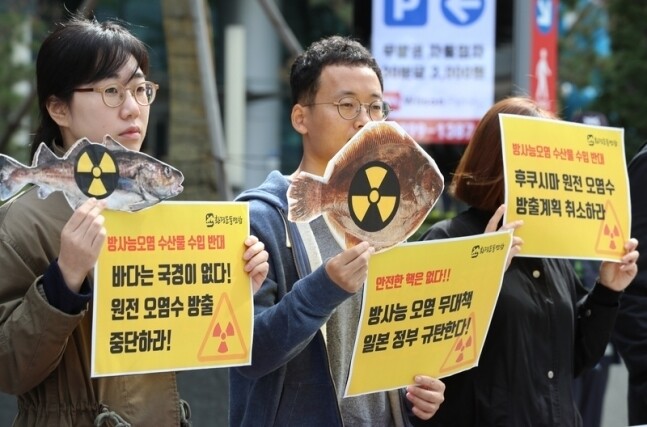hankyoreh
Links to other country sites 다른 나라 사이트 링크
S. Korea to oppose Japan’s decision to discharge toxic radioactive water from Fukushima disaster

On Aug. 13, South Korea’s Ministry of Foreign Affairs (MOFA) announced that it would actively respond to plans by Japan to discharge toxic radioactive water contaminated as a result of the 2011 Fukushima nuclear power plant meltdown.
The government’s announcement appears to be aimed at further pressuring Japan given the poor relations between the two countries following Japan’s recent retaliatory economic measures against South Korea. South Korean officials may be highlighting the danger of releasing the toxic water to damage the Shinzo Abe government’s careful management of preparations for the Tokyo Olympics, which will be held next year.
At a regular press briefing, MOFA spokesperson Kim In-chul told reporters, “Our government sent a statement with our concerns and requests to Japan in October 2018 immediately after becoming aware of Japan’s planned discharge of contaminated water into the sea in August the same year. We proposed that the two countries conduct bilateral and multilateral talks on the issue.” Kim also noted that the South Korean government had continued to express concerns to Japan about the discharge in multilateral and high-level bilateral talks during Northwest Pacific Action Plan and International Nuclear Regulators Association meetings.
In January of this year, the South Korean government demanded information and talks with Japan after the environmental group Greenpeace released a report about the toxic water discharge. In response to this, Japan repeated its stance that it would “sincerely explain” to the international community progress made in the discharge and any plans regarding the treatment of the toxic water in the future.
“If it's deemed necessary, we will also closely cooperate with our neighbors in the Pacific that also fear being affected [by the discharge], so as to actively cope with the problem of the discharge of toxic water,” Kim added. The South Korean government is reviewing plans to raise the issue during the International Atomic Energy Agency (IAEA) General Conference in September and the Top Regulators' Meeting (TRM) on Nuclear Safety meeting between South Korea, China and Japan, which will be held in China in November.
That being said, no other country except for South Korea is publicly raising issues about Japan’s plans to discharge the contaminated water. Nonetheless, “Greenpeace and other environmental groups are raising several concerns and we believe that environmental authorities in many countries bordering the Pacific Ocean are watching our actions,” a MOFA official told the Hankyoreh.
By making its progress on the issue public for the first time, the South Korean government appears to have joined the chorus of South Korean politicians and civic groups that have been raising concerns about the discharge along with worries about the safety of the 2020 Tokyo Olympics.
Democratic Party lawmaker Choe Jae-seong, the chairman of the Special Action Committee for Japan’s Economic Aggression, told Japanese reporters on Aug. 12 that Japan’s radioactive levels have surpassed dangerous levels and that Japan was turning Olympic athletes and those living in surrounding countries into “hostages.”
Japanese media, citing a statement made by Tokyo Electric Power Co. (TEPCO), said that following the 2011 meltdown the amount of contaminated water stored in Fukushima No. 1 nuclear power plant is increasing by 170 tons day. The power company was reported to have said that it will run out of storage space for the toxic water by around summer of 2022.
By Noh Ji-won and Park Min-hee, staff reporter
Please direct comments or questions to [english@hani.co.kr]

Editorial・opinion
![[Column] Has Korea, too, crossed the Rubicon on China? [Column] Has Korea, too, crossed the Rubicon on China?](https://flexible.img.hani.co.kr/flexible/normal/500/300/imgdb/original/2024/0419/9317135153409185.jpg) [Column] Has Korea, too, crossed the Rubicon on China?
[Column] Has Korea, too, crossed the Rubicon on China?![[Correspondent’s column] In Japan’s alliance with US, echoes of its past alliances with UK [Correspondent’s column] In Japan’s alliance with US, echoes of its past alliances with UK](https://flexible.img.hani.co.kr/flexible/normal/500/300/imgdb/original/2024/0419/2317135166563519.jpg) [Correspondent’s column] In Japan’s alliance with US, echoes of its past alliances with UK
[Correspondent’s column] In Japan’s alliance with US, echoes of its past alliances with UK- [Editorial] Does Yoon think the Korean public is wrong?
- [Editorial] As it bolsters its alliance with US, Japan must be accountable for past
- [Guest essay] Amending the Constitution is Yoon’s key to leaving office in public’s good graces
- [Editorial] 10 years on, lessons of Sewol tragedy must never be forgotten
- [Column] A death blow to Korea’s prosecutor politics
- [Correspondent’s column] The US and the end of Japanese pacifism
- [Guest essay] How Korea turned its trainee doctors into monsters
- [Guest essay] As someone who helped forge Seoul-Moscow ties, their status today troubles me
Most viewed articles
- 1[Column] The clock is ticking for Korea’s first lady
- 2[Correspondent’s column] In Japan’s alliance with US, echoes of its past alliances with UK
- 3After 2 months of delayed, denied medical care, Koreans worry worst may be yet to come
- 4[Column] Has Korea, too, crossed the Rubicon on China?
- 5[Editorial] When the choice is kids or career, Korea will never overcome birth rate woes
- 6Samsung barricades office as unionized workers strike for better conditions
- 7US exploring options for monitoring N. Korean sanctions beyond UN, says envoy
- 8US overtakes China as Korea’s top export market, prompting trade sanction jitters
- 9[Photo] Smile ambassador, you’re on camera
- 10Hong Se-hwa, voice for tolerance whose memoir of exile touched a chord, dies at 76